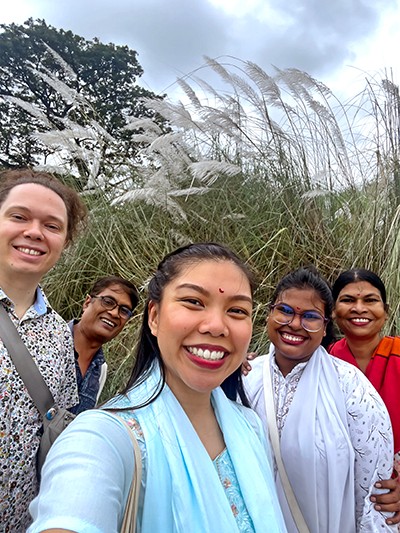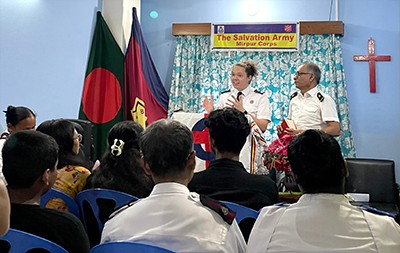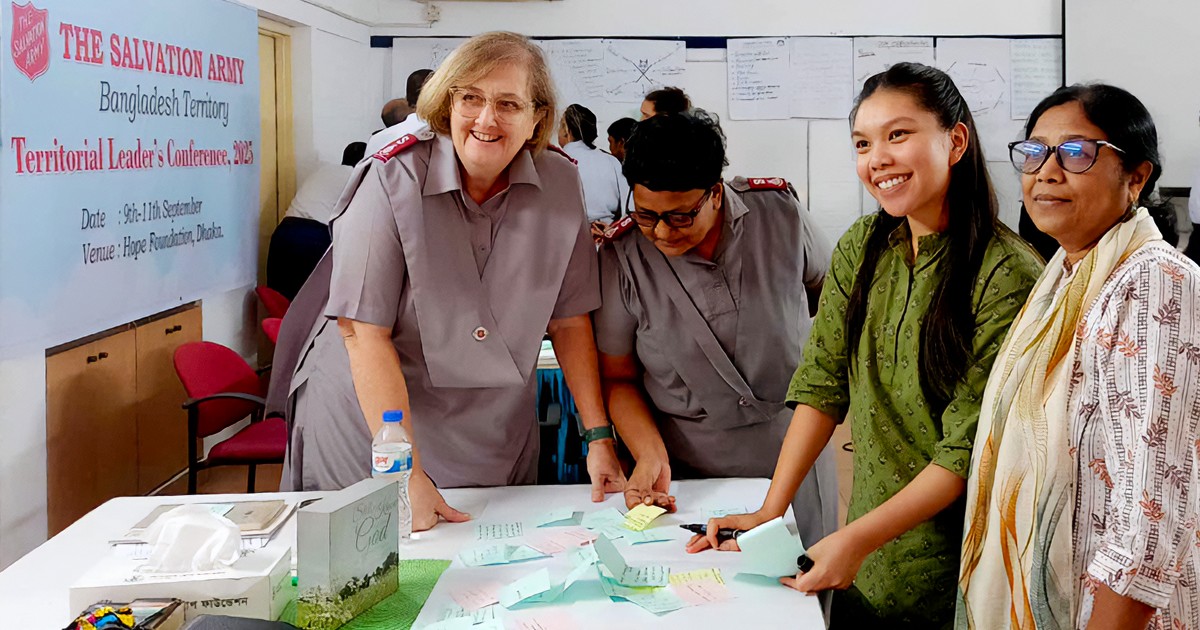Canadian Salvationists Jahred and Jessica Warkentin continue to share their experiences and prayer requests as they serve in ministry with The Salvation Army in Bangladesh. See the end of the article for a link to past blog entries.
“What do you actually do?”Jessica and I didn’t know much about our roles before moving to Bangladesh. We knew our titles and eventually got job descriptions but had no idea how those descriptions would materialize into daily duties in Dhaka. Now six months in, we feel we have enough experience under our belts to explain what it is we do each day at territorial headquarters (THQ) and beyond.
Jessica

Jahred and Jessica with new friends
As territorial development officer, I am responsible for overseeing our various projects. Most of my time is spent on our four community development projects. Briefly, they are:
- Pathways to Women Empowerment. Our vocational training centre in Old Dhaka teaches vulnerable women how to sew and tailor clothing. Women are connected to crucial services in their community, such as legal support, health services and other vocational training, so that they can be empowered in their everyday life. Communities also receive awareness sessions on important issues, such as human rights, gender-based violence and child rights and protection, among others.
- Sahanasilata (Resilience) Bangladesh. The largest project, spanning three administrative areas and nine upazhalias (municipalities), promotes resilience to climate and economic shocks by working directly with farmers, market committees, community members and government officials. Climate-smart agriculture, disaster-risk reduction and management, WASH (water, sanitation and hygiene) initiatives, self-help groups, as well as awareness on gender rights, peace building and positive caregiving are all part of the project’s holistic approach to community empowerment and mobilization.
- Healthy and Safer Communities (Phase 2). The Army’s clinic in the Mirpur-11 neighbourhood provides much-needed medical support to people with leprosy and tuberculosis. The project primarily serves the Bihari camps in Mirpur, and this phase looks to increase awareness on preventing illness with a new focus on good nutrition and WASH practices. Self-help groups, youth and kids’ clubs and medical campaigns are also part of their regular activities, along with promoting community awareness of gender equity, child rights and positive caregiving.
- Breaking the Cycle of Sexual Exploitation. The health care and counselling centre in Jashore supports women who wish to leave the sex trade. In addition to helping them leave this profession, project staff help them reintegrate into society by finding suitable living arrangements, connecting them with vocational training and startup capital and providing ongoing counselling support. The Army also runs a drop-in centre where children from the brothel find a nurturing and caring environment in which to learn, play, rest and develop positive social skills. Working in communities with vulnerable children, the project works directly with families, youth, schools, community leaders and local government representatives to strengthen their collective response against trafficking.
I also work alongside our supporting territories and host them while they visit our projects to promote stronger collaboration. We are in the process of establishing a community development strategy and working to close off several old projects. Like any office job, I often find myself in meetings: monthly project expenditure boards, monthly one-on-ones with the project managers, bi-weekly territorial management committee boards, weekly program/development committee boards. Despite how chaotic my schedule often looks and feels, I am thankful for all the things I’ve learned so far and all the ways that God encourages me to trust and lean on him more and more every day.
Jahred

Jahred preaches at Mirpur 10 Corps
As program co-ordinator, I hold less responsibility than Jessica (at least from an organizational hierarchical standpoint), which frees me to explore many interesting avenues. I am primarily responsible for supporting our secretary for program, who oversees all corps activities, development work and institutional programs. Across the territory, we have 35 corps, four development projects and two schools. I have recently started working closely with our Integrated Children’s Centre and Blind School in Savar, helping them develop a new sustainability plan and repair some property. Another large focus is supporting the other program department staff, mainly our territorial youth and candidates officer and the corps support/income generation officer. Currently, I am aiding in our implementation of Alpha by piloting the program at THQ. I have also been working toward building a territorial youth group network called Branches of Life, which will bring 45 youth from across the territory together for weekly online Bible study and quarterly in-person Bible teaching and ministry training.
This large net allows me to jump from project to project and dip my feet in work across both the church and social arms of The Salvation Army. Still, like Jessica, I sit on a few boards, notably our program/development board, literature board, risk management board and policy board, when needed. As someone not cut out for full-time office work, I have the pleasure of attending and facilitating various affairs across the territory, including site visits, corps assessments, training and rallies. Recently, I facilitated training on conducting focus groups and surveys for a project’s evaluation team, a topic close to my heart. Outside of work responsibilities, I have also had the chance to preach at two corps and children’s rallies.
Jessica and I have also connected with other NGOs. I toured the Bangladesh Bible Society facilities, and together we have been in touch with leaders from Tearfund, SIM and Liebenzell Mission International. We have looked for ways to collaborate, get a better picture of the current ministry landscape in Bangladesh, and support each other through prayer. We are all working toward one kingdom goal, which we know will only be reached through ecumenical partnership.
Outside our office days, we have still been up to a few adventures. We have made a new rickshawala friend named Babu, who we regularly employ to drive us around the city. He has started calling us his big brother and sister and enjoys practising his English and teaching us new Bangla. One day, as though he was reading my mind, he asked if I would like to drive the rickshaw (a childhood dream). We switched seats and he played passenger as I steadied the throttle and took us around the block. If this ministry thing doesn’t work out, I’m glad to know I have a second use here in Bangladesh. (See video below.)
Though some days it feels like we have already lived a life’s worth of work, we recognize that this is merely the beginning of what God has laid before us.
Prayer Requests:
- For our work permits and visas to come quickly. It has been a lengthy process that we hope will be cleared up soon.
- That new ministries would continue to grow and flourish (Alpha, Branches of Life, men’s ministry).
- For the community development strategy to be completed.
- Willingness to explore new ways of doing things, for both us and the territory.
Praise Reports:
- Opportunities to take a break and rest.
- We have found a group of board gamers!
- Continued progress in our language learning.
- Slowly but surely building community.
Read more Letters from Bangladesh here:










Leave a Comment